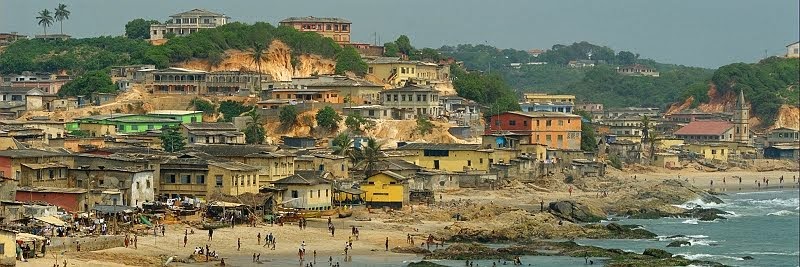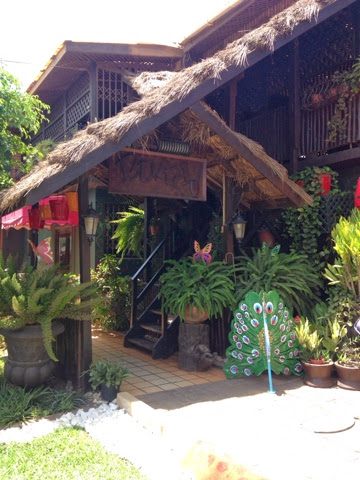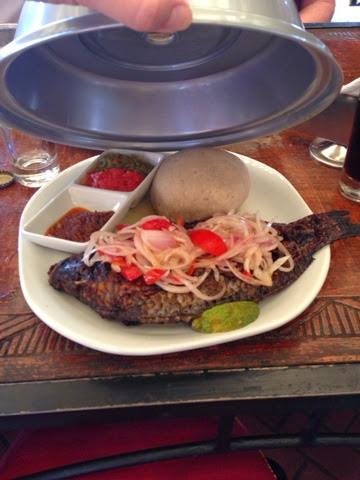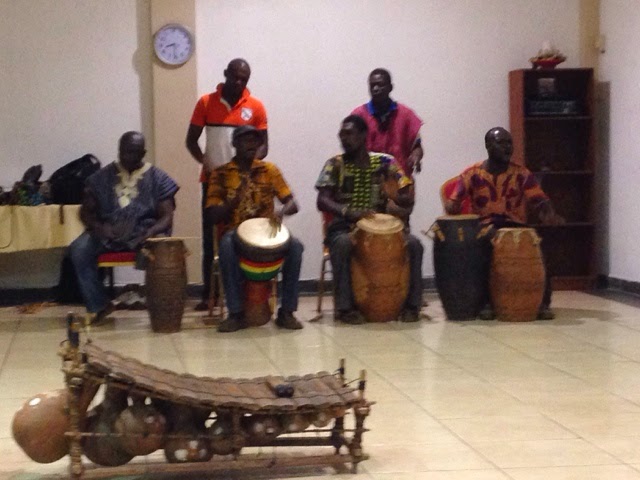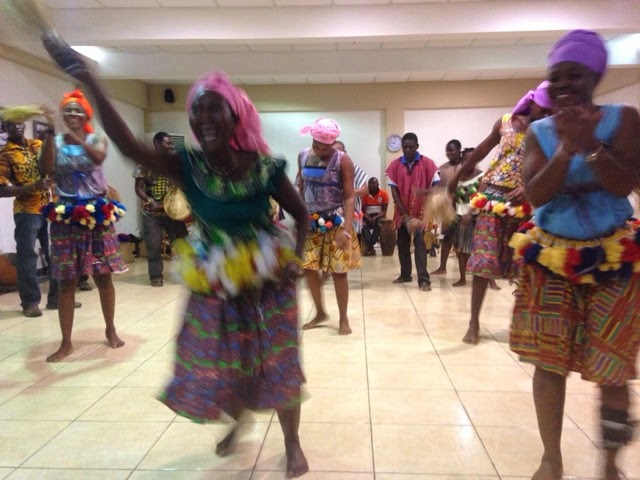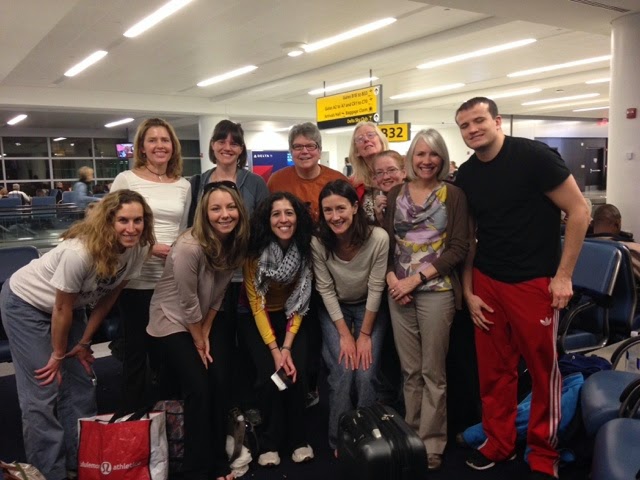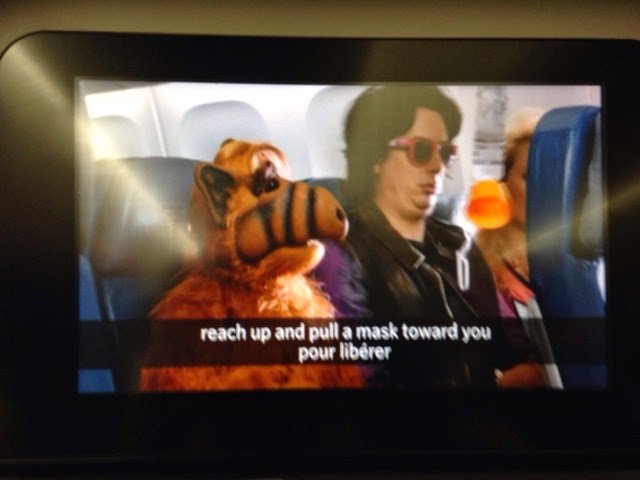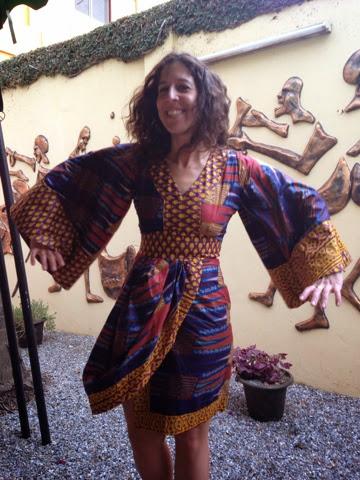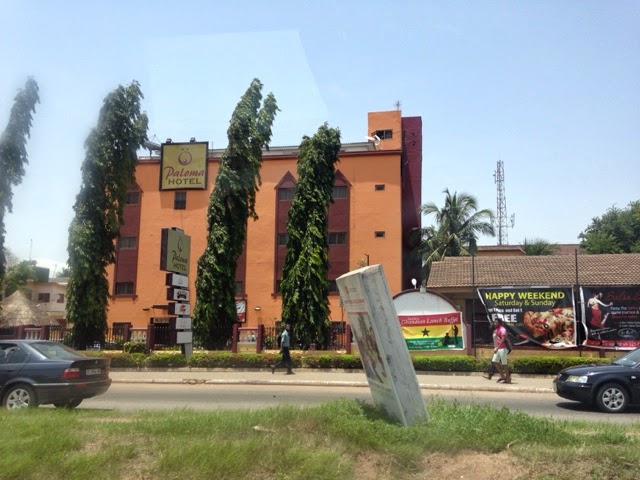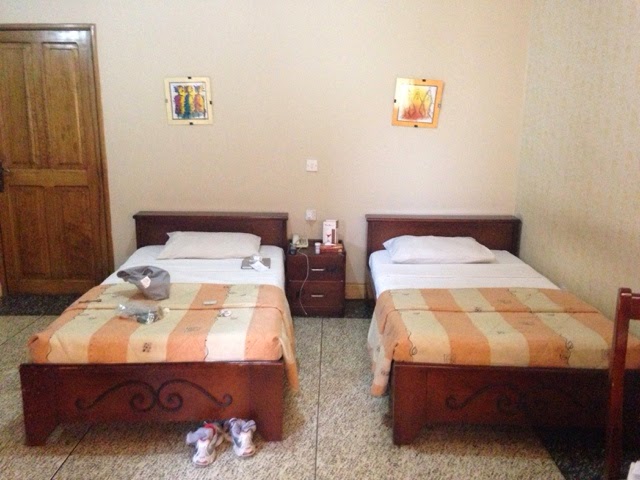MOSQUITO COUNT
Three. Even after a day in a rainforest. Nope. Just got bit on my forehead writing this. DAMMIT. Four.
NESCAFE
Today was a new discovery in the search for breakfast fooding. We were able to have late start and were going to meet Justice, our driver, at 10am in front of the hotel. The other groups from Takoradi and [fill in name here when I remember what town they were from] were going to meet us then too. Back to the discovery. Linda, who is Bev's partner in Takoradi, from California, and a super neat lady who has kayaked in Alaska and taught at an Indian Reservation. She said she made a fake frappacinno by putting 3 in 1 in ice water. Linda is a genius. 3 in 1 is back.
TIME
We waited for the other groups for almost an hour to arrive to our hotel before we all left for Kakum National Park. This has been a common practice. Very similar to Arab time, but I would say Ghanian time is even more extreme. Everyone admits they don't really have a concept of time and as a traveler it must be accepted or you will start to become quite frustrated. I found myself frustrated at times mostly because I just want to make the most of my time here and think that idling is not the best way to make that dream come true. But in fact it is in the idling that I have had memorable conversations with those around me. Time is timeless as they say here in Ghana.
KAKUM NATIONAL PARK
Kakum is only about an hour drive north from Cape Coast so it was a wonderful relief after the road travel yesterday. Justice was able to negotiate the student rate for us so instead of 40 cedi we paid only 20. In Kakum I saw my first wild elephant
[insert fake elephant photo here]
For those who haven't read the Bradt Ghana guidebook from cover to cover like I have, Kakum is Ghana's largest remaining rainforest. It also provides water to over 130 surrounding cities and communities. But what it is most known for are is its canopy walk.
[insert canopy walk photos here]
[and here]
[and here]
The whole walk only took us a couple of hours, but what I found most interesting was how fearful most Ghanians were to cross and how excited we Americans were. Maybe this is an effect of Xtreme sports. Or maybe Americans just think they are invincible so walk high above trees on a bridge made of rope no problem. Or Nike 'Just Do It' is a real thing. I don't know, but we were stuck behind school children for quite sometime who were holding on to dear life. It reminded me of a comment the Wesly Girls' School librarian made to us the other day. He said, "You are welcome. Please enjoy yourselves. You will learn we don't live in trees." Jokingly, of course, but with an air of truth when fighting stereotypes by those most ignorant. Ghanians actually not too found of hanging out among the trees.
HANS GUESTHOUSE AND BOTEL
The guidebook seems to think this place is the neatest of the neat because it's a restaurant that sits above a pond of crocodiles. Okay. All of that was in fact true. And actually Ioved watching the birds hanging out in the tree while I was eating, but I'm not sure I got the tourist draw. Maybe that's all it really was. A tourist site to say you've seen a crocodile. You were allowed to pet them and go up to them as well. They roam free. But I wasn't about to do that. I am not that Xtreme.
[insert bird photo here]
I did love this statue.
[insert little peeing boy here]
And their Red Red (beans) and fried plantains were yummy. I was even congratulated by the waitress at the end for how well I cleaned my plate.
[insert before/after photo here]
BAOBAB MORINGA RESTAURANT AND CRAFTS
We returned from our daytime camping trip, grabbed our electronics, and headed to a social justice-y cafe back in Cape Coast that lies adjacent to the Castle. The front of the restaurant has a small shop that sells crafts made by students at the Baobab School. Things like batik (printed cloth), kente (traditional hand-stitched cloth, canvas paintings, and other small trinkets volunteers and tourists might buy to take home to friends and family. I bought a couple kente cloths and then chatted with the girls at the cash register for a bit. They are 20somethings from Germany who have been in Ghana volunteering at the shop for the last 8 months. The school was started by a German and so they get other germans to come here to do their volunteer service. It's a nice place with outside seating overlooking the ocean. This is the first place I've had real non-Nescafe coffee and dessert (banana muffin). It's a vegetarian/vegan place. One of very very few in Ghana. Probably the only one in Cape Coast.
CONTROVERSIAL TOPIC*
Unfortunately (for many reasons) there are many children that surround the shop hoping to score cash from foreigners feeling guilty. One of the Ghanian waiters would come out and talk to them every 20 minutes to tell them to stop and go home. But that was not discouraging to these kids. They are terribly amused with themselves. One little boy came up to us, maybe 5 or 6 years old, and just straight up asked, "Where is your money?"
You want to be friendly and chat and say "hello" and "what's your name" but in the end it comes down to what are you going to give me because you have and we have not. That has been a hard concept to encounter since we've been here in Ghana. It's a completely different atmosphere when we are visiting the schools. That is not the culture. And it's not the culture in Ghana as well. You do not many see adults (I haven't seen any at all) begging on the street. I've only seen children. And very young children. Under 10 years old. Where are they learning this behavior from? Because it is definitely not taught in the schools.
*Disclaimer: I have not thoroughly researched this outside of my own observations, chatting with colleagues, and a few host teachers. No one is ignoring the terrible poverty that faces so many Ghanian kids today. But it is a concerning sight for future generations in Ghana nonetheless. All countries encounter stereotypes, but it's one thing to overcome the world thinking you're a country of internet-obsessed porn watchers, it's another thing to overcome the world believing you're a country of poor people begging on the street.
Three. Even after a day in a rainforest. Nope. Just got bit on my forehead writing this. DAMMIT. Four.
NESCAFE
Today was a new discovery in the search for breakfast fooding. We were able to have late start and were going to meet Justice, our driver, at 10am in front of the hotel. The other groups from Takoradi and [fill in name here when I remember what town they were from] were going to meet us then too. Back to the discovery. Linda, who is Bev's partner in Takoradi, from California, and a super neat lady who has kayaked in Alaska and taught at an Indian Reservation. She said she made a fake frappacinno by putting 3 in 1 in ice water. Linda is a genius. 3 in 1 is back.
TIME
We waited for the other groups for almost an hour to arrive to our hotel before we all left for Kakum National Park. This has been a common practice. Very similar to Arab time, but I would say Ghanian time is even more extreme. Everyone admits they don't really have a concept of time and as a traveler it must be accepted or you will start to become quite frustrated. I found myself frustrated at times mostly because I just want to make the most of my time here and think that idling is not the best way to make that dream come true. But in fact it is in the idling that I have had memorable conversations with those around me. Time is timeless as they say here in Ghana.
KAKUM NATIONAL PARK
Kakum is only about an hour drive north from Cape Coast so it was a wonderful relief after the road travel yesterday. Justice was able to negotiate the student rate for us so instead of 40 cedi we paid only 20. In Kakum I saw my first wild elephant
[insert fake elephant photo here]
For those who haven't read the Bradt Ghana guidebook from cover to cover like I have, Kakum is Ghana's largest remaining rainforest. It also provides water to over 130 surrounding cities and communities. But what it is most known for are is its canopy walk.
[insert canopy walk photos here]
[and here]
[and here]
The whole walk only took us a couple of hours, but what I found most interesting was how fearful most Ghanians were to cross and how excited we Americans were. Maybe this is an effect of Xtreme sports. Or maybe Americans just think they are invincible so walk high above trees on a bridge made of rope no problem. Or Nike 'Just Do It' is a real thing. I don't know, but we were stuck behind school children for quite sometime who were holding on to dear life. It reminded me of a comment the Wesly Girls' School librarian made to us the other day. He said, "You are welcome. Please enjoy yourselves. You will learn we don't live in trees." Jokingly, of course, but with an air of truth when fighting stereotypes by those most ignorant. Ghanians actually not too found of hanging out among the trees.
HANS GUESTHOUSE AND BOTEL
The guidebook seems to think this place is the neatest of the neat because it's a restaurant that sits above a pond of crocodiles. Okay. All of that was in fact true. And actually Ioved watching the birds hanging out in the tree while I was eating, but I'm not sure I got the tourist draw. Maybe that's all it really was. A tourist site to say you've seen a crocodile. You were allowed to pet them and go up to them as well. They roam free. But I wasn't about to do that. I am not that Xtreme.
[insert bird photo here]
I did love this statue.
[insert little peeing boy here]
And their Red Red (beans) and fried plantains were yummy. I was even congratulated by the waitress at the end for how well I cleaned my plate.
[insert before/after photo here]
BAOBAB MORINGA RESTAURANT AND CRAFTS
We returned from our daytime camping trip, grabbed our electronics, and headed to a social justice-y cafe back in Cape Coast that lies adjacent to the Castle. The front of the restaurant has a small shop that sells crafts made by students at the Baobab School. Things like batik (printed cloth), kente (traditional hand-stitched cloth, canvas paintings, and other small trinkets volunteers and tourists might buy to take home to friends and family. I bought a couple kente cloths and then chatted with the girls at the cash register for a bit. They are 20somethings from Germany who have been in Ghana volunteering at the shop for the last 8 months. The school was started by a German and so they get other germans to come here to do their volunteer service. It's a nice place with outside seating overlooking the ocean. This is the first place I've had real non-Nescafe coffee and dessert (banana muffin). It's a vegetarian/vegan place. One of very very few in Ghana. Probably the only one in Cape Coast.
CONTROVERSIAL TOPIC*
Unfortunately (for many reasons) there are many children that surround the shop hoping to score cash from foreigners feeling guilty. One of the Ghanian waiters would come out and talk to them every 20 minutes to tell them to stop and go home. But that was not discouraging to these kids. They are terribly amused with themselves. One little boy came up to us, maybe 5 or 6 years old, and just straight up asked, "Where is your money?"
You want to be friendly and chat and say "hello" and "what's your name" but in the end it comes down to what are you going to give me because you have and we have not. That has been a hard concept to encounter since we've been here in Ghana. It's a completely different atmosphere when we are visiting the schools. That is not the culture. And it's not the culture in Ghana as well. You do not many see adults (I haven't seen any at all) begging on the street. I've only seen children. And very young children. Under 10 years old. Where are they learning this behavior from? Because it is definitely not taught in the schools.
*Disclaimer: I have not thoroughly researched this outside of my own observations, chatting with colleagues, and a few host teachers. No one is ignoring the terrible poverty that faces so many Ghanian kids today. But it is a concerning sight for future generations in Ghana nonetheless. All countries encounter stereotypes, but it's one thing to overcome the world thinking you're a country of internet-obsessed porn watchers, it's another thing to overcome the world believing you're a country of poor people begging on the street.
